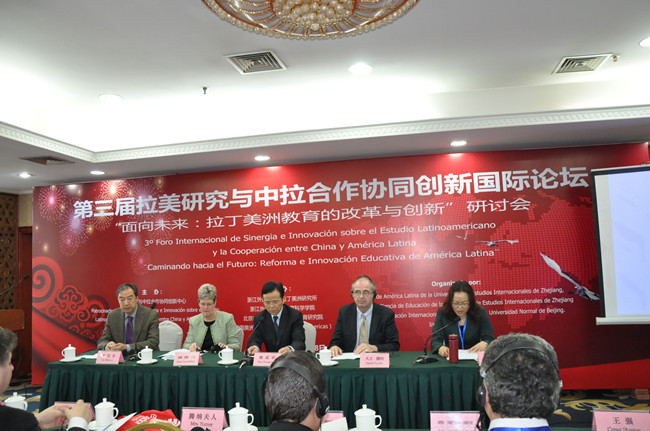The 3rd International Forum of Latin America Studies and Sino-Latin America Collaborative Innovation Held
Hosted by the Center of Latin America Studies and Sino-Latin America collaborative Innovation, and jointly undertaken by Institute of Latin America Studies and School of Educational Science in ZISU along with Institute of International and Comparative Education in Beijing Normal University (BNU) and Institute of the Americas, the Seminar “Face the Future: Educational Reformation and Innovation in Latin America” of the 3rd International Forum of Latin America Studies and Sino-Latin America Collaborative Innovation was held in Hangzhou on October 18th. Yao Chengrong, Party Secretary of ZISU and vice president of Chinese Association for Latin American Studies (CALAS), delivered the salutatory. Zheng Yali, vice president of ZISU and standing deputy director of Institute of Latin America Studies, presided over the opening ceremony.

In his salutatory, Yao Chengrong remarked that education is the foundation for a country to survive and strengthen. When entering into the 21st century, there is a new wave of reformation and innovationon educational system around the globe, in order to adjust it to political, economic and social development and face the challenge of internationalization and globalization. Both China and Latin America are important areas in educational reformation and innovation, and they have made active attempts in multi areas such as basic education, higher education and vocational education, and have accumulated some experience. In recent years, with the rapid development of bilateral political and economic relations, there is an increasingly frequent cultural exchange and a continuously deepening educational cooperation between China and Latin America. The forthcoming Sino-Latin America cooperative forum will provide a broader space for China and Latin American countries to communicate and collaborate in areas like education and cultural exchange, and provide a stage for both sides to borrow experience about educational reformation and innovation, and promote jointly a future-oriented education as well. Under this kind background, it is particularly necessary and essential to discuss new characters and new trends about educational cooperation, communication, reformation and innovation between China and Latin America countries, thus to promote educational equality and development in a background of internationalization.
David Turner, professor from University of South Wales and the former chief finance officer of World Council of Comparative Education Societies (WCCES) as well as S.Lynne Walker, vice president of Institute of the Americas, delivered salutatory respectively. Prof Gu Mingyuan, honorary president of The Chinese Society of Education (CSE), sent a congratulation letter to the forum. Xu Shicheng, director of Institute of Latin America Studies in ZISU and honorary member of the Chinese Academy of Social Sciences, made a summary statement.
The forum was divided into three units fordiscussion:
Unit One “general view: The process and present situation of educational development in Latin America” was presided by S.Lynne Walker, vice president of Institute of the Americas. Liu Baocun, dean of Institute of International and Comparative Education in BNU, remarked on unit one. Patricio Palacios, counselor from Ecuadorian embassy, highlights the central innovative project in Ecuadorian educational reformation - “Yachay Plan”. David Turner, the former chief finance officer of WCCES, have done an empirical analysis on educational innovation development in Latin America with a series of fresh data. Senior professor Juan Gonzalez of Colima University in Mexico prospected higher education reformation direction of Mexico in the future. Associate Professor Lauren ILA Misiaszek from Institute of International and Comparative Education in BNU analyzed the humanism and social theories ineducator Carlos Alberto Torres’ masterpiece “First Freire”.
Unit two “insight: educational reformation and innovation in Latin American countries” is presided by Prof. Liu Baocun, dean of Institute of International and Comparative Education in BNU. Zhang Shousong, assistant dean from School of Educational Science of ZISU, remarked on the discussion according to his own experience. Foreign teacher Greg Misiaszek from Institute of International and Comparative Education in BNU comparatively analyzed contextual teaching under a background of globalization with examples of Argentina, Brazil and United States, and put forward its instructive experience for sustainable development. He Linli from Institute of Latin American studies in Southwest University of Science and Technology (SWUST) comparatively researched on teaching evaluation of higher education in Chile and presented the instructions on teaching evaluation in China. Zou Lei, from department of student affairs in ZISU, compared ideological and political education between Chinese universities and Cuban universities. He Weiqiang, assistant dean from College for Teacher Development of ZISU, put forward the realistic background for intergenerational transmission of children poverty and the process in educational welfare reform to explain the possible instruction for Latin American countries.
Unit three “focus: educational reformation and innovation in Mexico” was presided by Tang Jun, deputy director of Institute of Latin America Studies in ZISU, and was remarked by Xu Shicheng, director of Institute of Latin America Studies. Prof Jose Manual, dean of School of Economics in Colima University, analyzed the internationalization of Mexican education as well as its communication and cooperation with China alongw ith prof Cesar Bustos. Zhang Qing, teacher from Center of Latin America Studies in Sichuan International Studies University (SISU), researched the route, effect and motivation for Mexican basic education reform with a model of decentralization.
More than 80 people attended this forum, including experts from institutes and universities at home and abroad, such as Ecuadorian embassy in China, WCCES, Institute of the Americas, Colima University, BNU, SWUST and SISU, as well as students and teachers from ZISU.
